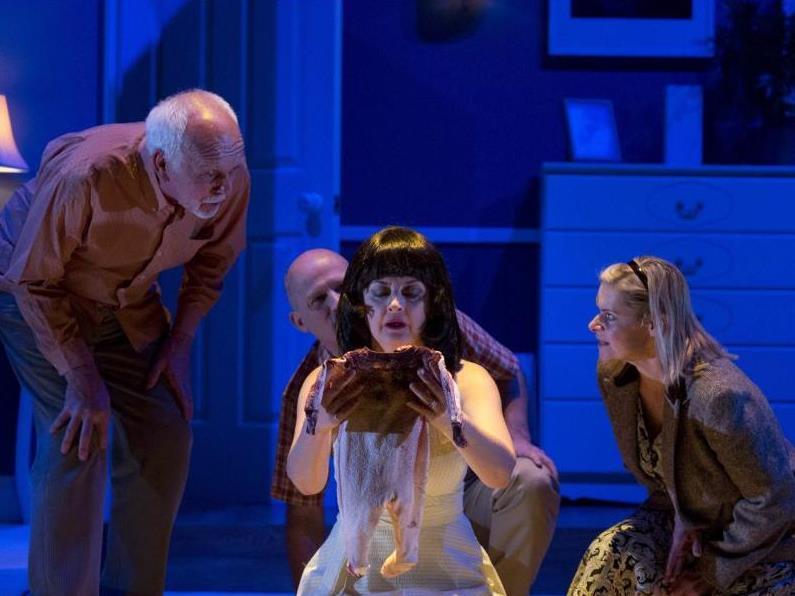A scene from the Merrigiong Theatre Company production of Alana Valentine’s Letters to Lindy. Photo by Lisa Tomasetti.
I remember one night at a youth hostel in Florence, when I was travelling alone across Europe. The Italians are so civilised that you could buy a glass of wine to have with your dinner while every other youth hostel in the world was dry. So sophisticated, I thought, settling down for my spaghetti and vino at a shared table. Three other Australian girls were seated a little up from me and soon asked me to join them. I noticed that they weren’t having any wine and they did look a little, well, sour, but I was feeling gregarious and in the mood for a dose of home. The source of their problem soon emerged. ‘We have this schedule that we worked out before we left Australia’, they said and showed me a neat, handwritten diary. ‘We have “see David at the Accademia” in the morning and then “visit the Uffizi” in the afternoon. Every day is planned’. There was a silence and then a sort of sob, ‘But there are things we weren’t expecting that we can’t fit into the schedule’.
I tipped back my spiky black hair, rattled my silver bracelets and peered at them through my heavily kohled eyes. ‘So why don’t you just change the schedule?’ I suggested. They looked at me as shocked as Queen Victoria apparently was when she first clapped eyes on Michelangelo’s masterpiece, sans fig leaf. ‘Can we do that?’ tried one girl. ‘But then we won’t see everything’, said the other. ‘That’s right’, chimed the third. I leered with my best gothic stare, ‘But what you do see you’ll really enjoy. At the moment you’re seeing everything but not enjoying any of it’. I have no idea what this little trio resolved, they retreated to their dormitory while I stayed for another glass of wine and got talking to an American woman who repaired helicopters for the army.
Creating a stage play about a community is a little like being confronted by all the splendours of Italy – you aren’t going to be able to put everything in and it’s going to make you miserable if you try. You need to come up with a question, a notion to interrogate, a dramatic premise that will guide you as you move through your interviews. You may not have it on the first interview or even the second. In fact, it could be really useful to see what emerges as a common concern in the community. But you’re going to want to have it more or less in place by your fourth or fifth interview. A common concern of the community, or a source of conflict there, is not necessarily a good premise for a stage play. I could have written the Mahabharata about the South Sydney Rugby League Football Club and I was told a lot about the club’s internal politics. But who’s really interested in that outside of the club itself? Of course David Williamson wrote a play about the politics of a fictional football club that serves as a fascinating forum for human nature in extremis. But if you’re writing specifically about a particular community you’re going to want a dramatic premise, an unanswerable dramatic engine, that will make their machinations interesting beyond the narrow confines of the community. The dramatic premise at the heart of Run Rabbit Run is the conflict between tradition and change, between the loyalties of your childhood and the realities of your adulthood, about the commercial demands of professional sport in the 21st century and the community values of kindness, tribalism and loyalty. About three interviews into my research, when I sat across the table from a well-to-do man who spoke with passion about the injustice of the big end of town riding roughshod over ‘the little people’ in the club who had little else but their football team to inspire them, I began to see the drama at the heart of this story. I began to wonder how this team, which hadn’t made a semi-final since the early 1970s, inspired people to sacrifice so much time and energy and, yes, even their own self-interest, to fight. And I began to be scared by the possibility that I had come across people of genuine moral courage.
Why scared? Because it is much harder to tell a story about the best in human beings. It’s easier to be cynical and damning of human nature. But here were people of sincere faith, genuine commitment and sacrifice, of utter communal goodness. I had to put that on stage without making them faultless saints. I had to find their Achilles heel, their fatal flaw and lay it out in front of them. By the fifth or sixth interview I knew what I was looking for – I was looking for that spark, that drive, that belief that they could change the world. I was digging for the lucid, working-class philosopher, the revolutionary, the men and women of vision. Every question narrowed my focus. It’s like starting a jigsaw puzzle when you spread out all the pieces. Maybe you group them into particular colours to divide it into sections. But as soon as you find your first piece the next thing you’re looking for is a specific piece that will fit with the previous one. And so on.
So, I like to be random enough to respond to what is there, rather than approaching the story with preconceived ideas, but avoid drifting on the surface of the community like a cork bobbing in a sea of possibilities. Your premise also has to connect with what intrigues, obsesses or terrifies you personally. The motor of your muse as a writer is specific to your experience in life and your own mangled, neurotic wad of fears and pleasures. When I wrote Parramatta Girls I was shamed by their story and fascinated by their survival but, four years into the project and with my own mother and grandmother dead, I had to acknowledge that I also wanted to be around a whole lot of tough older women. That said, I think a playwright’s instinct for a great story as opposed to simply a good one is probably more consistent than we might think, just as, when in Florence, we’re both going to want to see David’s cute little arse.
So be led by both your politics and your perversions, by your sense of justice and your sense of humour. And have a plan, but be prepared to change it if a better one swims into view. Whether you are working with oral interviews or material from the archive or writing a play with entirely fictional scenes, you always need to bring a unique perspective. Constructing a full-length work of theatre basically means making thousands of decisions – which bit, what words, set where, said by whom, and then what and then what – a thousand times over and over again. You need an idea to steer those decisions in order to create something with glorious insights and entertainment for your audience.
How do you develop ideas, theories, premises? Well, clearly you need to be able to think, to consider, to understand yourself and the world and, most particularly, your characters. You need to see a lot of theatre and understand its language. But beyond all that, you must have something to say. Something you believe. There are millions of ways for artists to interrogate and understand what they believe. You might keep a diary, you might be part of an artistic collective, you might read extensively and shape your own ideas by testing them against the ideas of others. Each time I write a play I find that I need a different process to ‘crack’ the premise of the work, which is kind of annoying. You might think that experience would teach you how to ‘do it’. But for each play you need to perceive the material in a way that no-one else has done. This perception is what you are selling or presenting to your audience, a ‘take’ that they will find intriguing.
So sometimes it takes weeks of feeling unproductive, misdirected, lost, stalled, confused, frustrated, irritated and bored before the penny drops. Partners who live with writers know this – the writer pleads that this time, this time, they really don’t know what they are doing, as they enact a version of themselves that the partner has never seen before. They may be uncharacteristically ebullient until the partner remembers that they are writing a kids’ show. They are anxious about disaster lurking around every corner and the partner remembers they are writing about a tragedy.
When I was writing my archive-based play about letters written to Lindy Chamberlain-Creighton, I found myself going through my untouched-for-some-time cupboards, drawers, files, storage boxes and cabinets. And not just in my office. Western consumerism means that all of us, even the poorest and youngest, store things that we don’t look at for years, forget we have and fail to sort through, catalogue, file or process into functionality. There is a delight and amazement, unparalleled by fresh purchases, of rooting through a cupboard to find something you have put away for ‘special’ but now want to bring out for daily use. Nostalgia and a flood of memories can be unleashed by a set of drawings that you haven’t looked at for a long time, you can chronicle the shock of change as you look at some despised piece of clothing that you now think might just be the right thing. There’s joy in finding old things transformed by time into something new. The small shock of that transformation builds new synapses for translating old ideas about what you are working on into fresh perceptions. It’s as though finding something new in the familiar affirms your faith that you can also do this in your work.
I’m out on a bit of a limb here because I’m trying to wrangle to the page the mysterious processes of creativity and, let’s be honest, it’s not like I’m spending all my writing time sorting through old trunks and obscure kitchen shelves. Especially in the case of my play Letters to Lindy, a huge amount of the work was administrative. That is a challenge in itself – visiting the library, copying the letters, typing them up, getting Lindy’s permission to use them, writing to the correspondents themselves seeking permission, scouring the electoral roles when the letters come back ‘Not at this address’ and so on. The last thing I needed, frankly, especially in this play, was even more sorting. At first I found myself thinking that I was procrastinating – tidying up rather than writing. But then one morning I woke up knowing why I thought Lindy had put so much energy and love into her own archives, understanding what I thought it was about. Drawing breath I realised that, right or wrong, I finally had my personal take on the material. I knew how to spin it on stage. I had been unconsciously mimicking Lindy, though I promise you, this never occurred to me until I came to the page and it suddenly became clear.
One of the things about an artist is the ability to see new ideas in hoary old truisms about human nature – romantic love, the lust for power and the conflicts inherent in being alive. The most original way to do this is to strain those ideas through the filter of yourself. You do that by being relentlessly (some would say selfishly) absorbed with your own experience. It’s a perverse truth that close work theatre, which looks to all the world like stories about other people, is really you parading your own concerns, perceptions, values and interests up on the stage. So give yourself over to the unconscious process. It may lead you to make a mess or tidy up – either way, you’ll be getting inside your characters from your own unique perspective.
* * *
Alana Valentine’s Bowerbird is a journey through the author’s life and plays, as well as the creative process behind the plays. One of Australia’s most inventive playwrights, Valentine shows the power of bringing new audiences into our theatres to share the space with traditional audiences, detailing how to gather and transform lived experience into compelling drama. In Bowerbird she reveals the motor of her artistry by combining stories from her life with observations from her experience.
Bowerbird is published by Currency Press. Visit www.currency.com.au for details.





